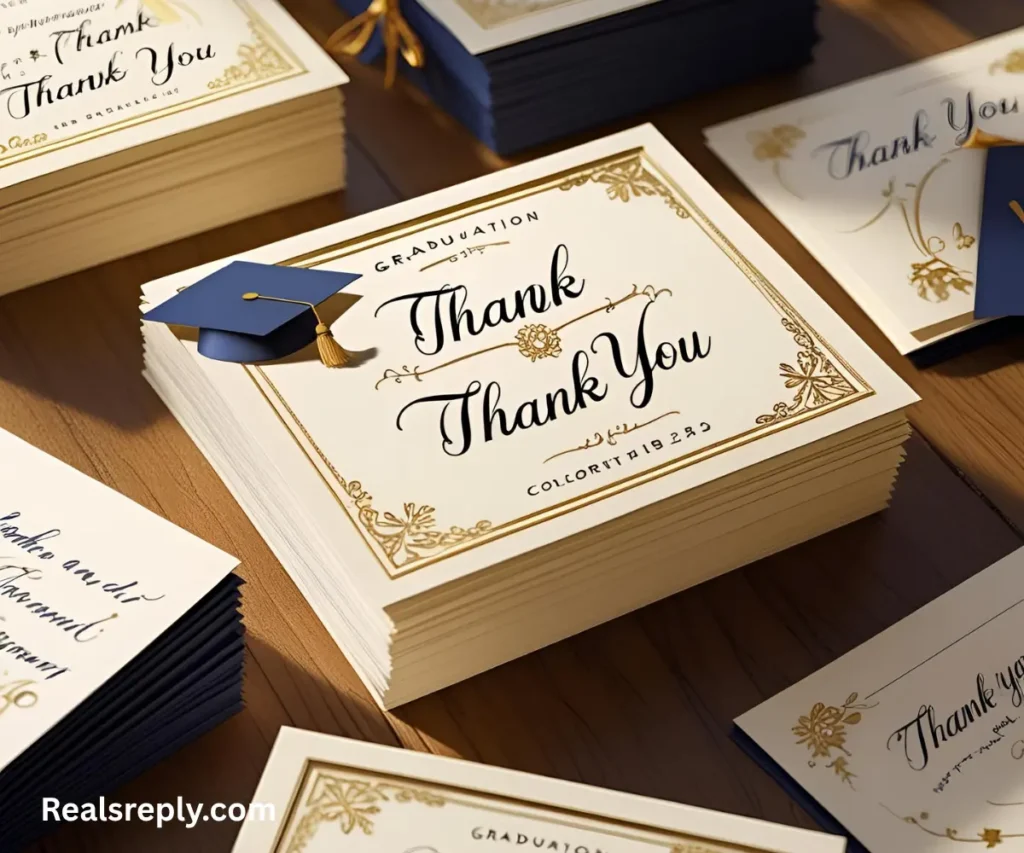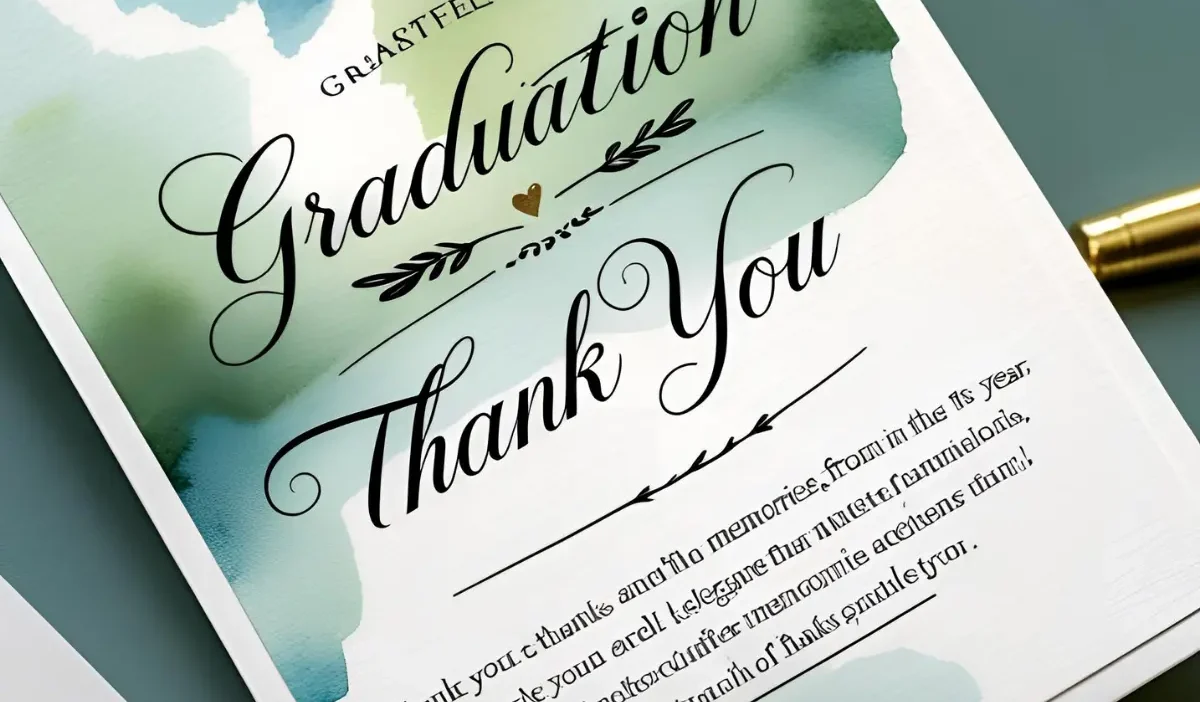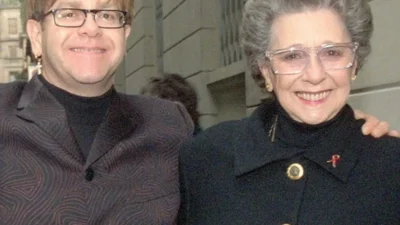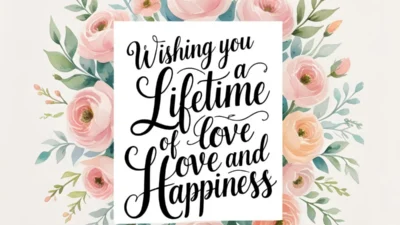Graduation is a huge milestone, a moment where dreams meet reality, and you’re surrounded by love and support from family, friends, and mentors.
You’ve worked hard, crossed the stage, and now it’s time to show gratitude.
Writing a graduation thank you card can feel overwhelming—what do you say to capture your appreciation?
Whether it’s for a gift, a kind word, or someone’s presence at your ceremony, a heartfelt note makes all the difference.
This guide will help you craft the perfect message, ensuring your thank you feels personal and sincere.
Let’s dive into what to say in a graduation thank you card to express your gratitude with warmth and clarity.
From specific examples to tips for different recipients, we’ll cover it all so your words leave a lasting impression. Ready to make someone smile?
Why Graduation Thank You Cards Matter

Thank you cards are more than just polite gestures; they’re a way to show gratitude for the support that helped you reach this milestone.
A thoughtful note strengthens bonds and acknowledges the time, effort, or gifts others shared. For example, your aunt might have sent a generous check, or a teacher offered inspiring advice.
A card shows you value their role in your journey.
Real-life scenario: Sarah’s uncle traveled hours to attend her graduation. She wrote, “Your presence made my day so special—thank you for being there!” This simple note deepened their connection.
What to say: “Thank you for celebrating my graduation with me! Your support means the world.”
What not to say: “Thanks for coming.” (Too vague, lacks warmth.)
Personalizing Your Message for Different People
Every thank you card should feel unique to the recipient. Tailor your words to reflect your relationship with them—whether it’s a parent, friend, or coworker.
Mention specific actions, like a gift or their attendance, to make it personal. This shows you took time to think about them.
Real-life scenario: Jake’s best friend gave him a journal for his next chapter. He wrote, “This journal is perfect for my new adventure—thank you for knowing me so well!”
What to say: “Your gift of [specific item] is so thoughtful, and I can’t wait to use it as I start [new phase].”
What not to say: “Thanks for the stuff.” (Too generic, misses the personal touch.)
Expressing Gratitude for Gifts
Graduation gifts—whether money, books, or keepsakes—deserve special acknowledgment. Mention the gift specifically and how you’ll use it to show appreciation. This makes the giver feel their effort was worthwhile.
Real-life scenario: Emma received a laptop from her parents. Her card read, “This laptop will help me excel in college—thank you for such an incredible gift!”
What to say: “Your generous gift of [item/money] will help me [specific use, e.g., start my career]. I’m so grateful!”
What not to say: “Thanks for the cash.” (Feels impersonal and dismissive.)
Thanking for Emotional Support
Sometimes, the best gift is someone’s encouragement or presence. Acknowledge their emotional support to show you value their role in your success. Highlight specific moments, like late-night study sessions or pep talks.
Real-life scenario: Liam’s mentor always believed in him. He wrote, “Your advice kept me going through tough times—thank you for believing in me.”
What to say: “Your encouragement during [specific moment] made all the difference. Thank you for being my rock!”
What not to say: “Thanks for the support.” (Too broad, lacks detail.)
Keeping It Short but Meaningful
You don’t need a long note to make an impact. A concise, heartfelt message can be just as powerful. Focus on sincerity and a personal touch, even in a few sentences. This works well for distant relatives or acquaintances.
Real-life scenario: Mia thanked her neighbor for attending her ceremony: “Your presence at my graduation meant so much. Thank you!”
What to say: “Thank you for celebrating my graduation! Your support made my day even brighter.”
What not to say: “Thanks.” (Too short, feels rushed.)
Adding a Touch of Humor or Personality
If it fits your style and the recipient, a lighthearted tone can make your card memorable. A funny or playful note works great for close friends or family who know your personality.
Real-life scenario: Alex thanked his brother with, “Thanks for the gift card—guess I can finally eat something besides instant noodles!”
What to say: “Your gift is awesome—now I can [funny or specific use]! Thanks for making my graduation epic.”
What not to say: “Nice gift, lol.” (Too casual, lacks warmth.)
Conclusion
Writing what to say in a graduation thank you card is all about showing genuine appreciation in a way that feels personal.
Whether you’re thanking someone for a gift, their presence, or their encouragement, a heartfelt note strengthens your connection and leaves a lasting impression.
Take a moment to reflect on what each person contributed to your journey, and let your words reflect that gratitude.
With these tips, you can craft messages that are sincere, thoughtful, and memorable.
So grab a pen, get writing, and make someone’s day with your kind words!




